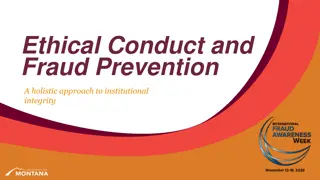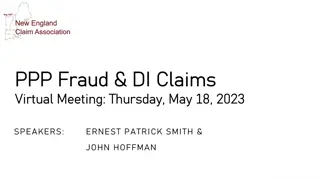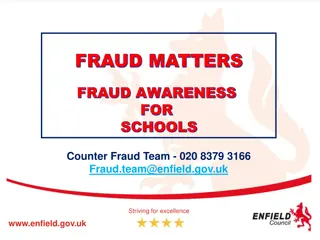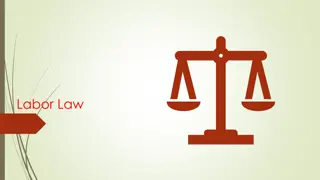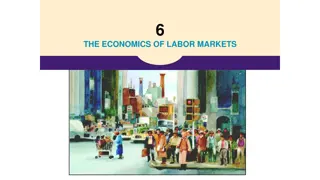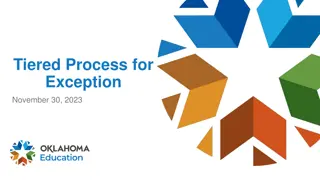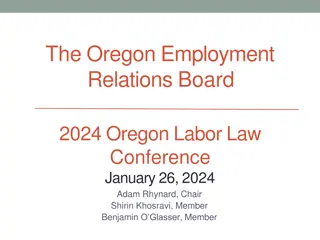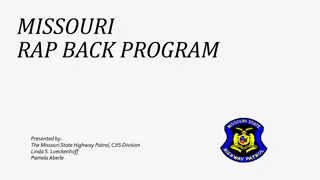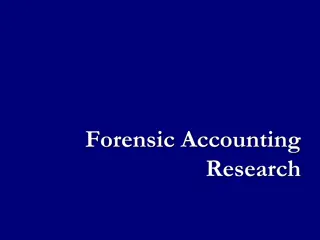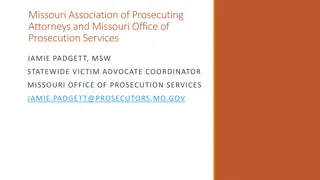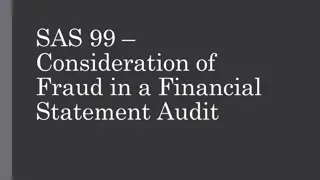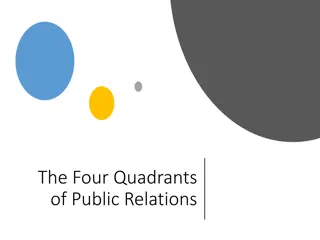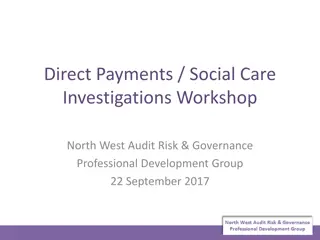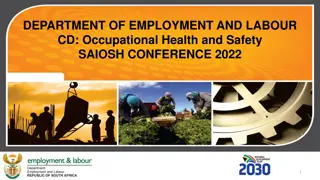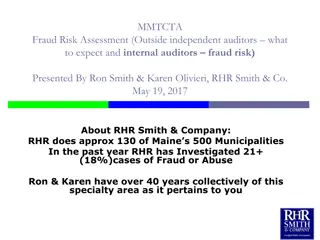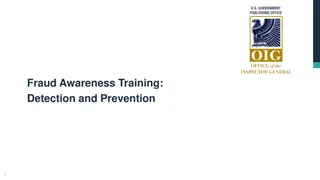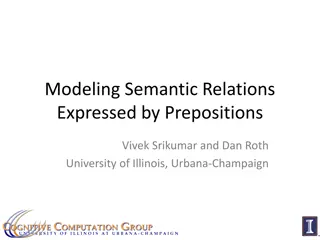Missouri Department of Labor and Industrial Relations (DOLIR) Fraud and Noncompliance Unit Overview
The Missouri DOLIR Fraud and Noncompliance Unit (FNU) was established in 1993 by the General Assembly to investigate fraud and noncompliance related to Chapter 287 RSMo (Workers' Compensation Law). The FNU is dedicated to promoting a safe work environment by upholding the integrity of Missouri's Workers' Compensation Law through investigation, prevention, and service. Employers, employees, insurers, and other stakeholders are urged to report any suspicions of fraud or noncompliance to the FNU for assistance. In 2022, the FNU conducted numerous investigations across Missouri counties, showcasing its commitment to ensuring compliance with the law.
Download Presentation

Please find below an Image/Link to download the presentation.
The content on the website is provided AS IS for your information and personal use only. It may not be sold, licensed, or shared on other websites without obtaining consent from the author. Download presentation by click this link. If you encounter any issues during the download, it is possible that the publisher has removed the file from their server.
E N D
Presentation Transcript
MO DOLIR DWC FRAUD AND NONCOMPLIANCE UNIT 2023 DWC Conference
The FNU was created by the General Assembly in 1993 to investigate fraud and noncompliance of Chapter 287 RSMo (Workers Compensation Law). The FNU has eight investigators, two supervisors, one support staff, and one manager. The Unit is based in Jefferson City, with three investigators assigned in Kansas City, two in St. Louis, two in Columbia, one in Cape Girardeau, and another in Springfield. THE FRAUD AND NONCOMPLIANCE UNIT (FNU)
Vision Statement: To promote a safe, supportive, fair, and equitable work environment by preserving the integrity of Missouri s Workers Compensation Law. We do this through: INVESTIGATION investigate all allegations of fraud and failure to comply with the Workers Compensation Laws. PREVENTION provide education about the Workers Compensation Laws and requirements. SERVICE Focus on effectively and efficiently serving employers, employees, insurers, and all stake holders impacted by the Workers Compensation Laws. THE FNU VISION STATEMENT
Our message to employers, employees, insurers and all stakeholders is to contact us early so we can help! Reporting: fraudandnoncompliance@labor.mo.gov 1-800-592-6003 PO Box 1009, Jefferson City, MO 65102-1009 General inquiries: www.labor.mo.gov 573-526-6630 573-526-1441 (FAX) THE FNU CONTACT INFORMATION
ANY PERSON may file a complaint alleging fraud or noncompliance relevant to the Workers Compensation Laws. In 2022, we conducted 389 investigations in 68 Missouri Counties, plus the City of St. Louis. 39% of the cases involved fraud allegations by employees, employers, and healthcare providers. 58% involved allegations of noncompliance (primarily failure to comply with the Workers Compensation Law s requirements, failure to maintain coverage and failure to report an injury). WHO CAN REPORT TO THE FNU & 2022 FNU STATS.
How to report to the FNU? 800#, email, DOLIR website, mail. Who makes reports to the FNU (2022 Stats)? Attorneys 7% Employers 3% Employees 18% Insurers 12% Healthcare 2% Anonymous 58% Others? Other state agencies (DES, DOI, etc), FNU inquiries. HOW TO REPORT TO THE FNU & WHO REPORTS?
When an allegation is received by the FNU The manager reviews and forwards to a supervisor for investigator assignment. The support staff enters the case into the case management system. The investigator conducts the investigation. At the conclusion of the investigation the investigator submits report to the supervisor with a recommendation for closure or referral. The supervisor reviews the recommendation and refers to the manager with their recommendation. THE FNU WORKFLOW
The manager reviews the case and recommendation, and either closes, or forwards to the Division Director for referral. The Director reviews the case and may refer to the Division s General Counsel s Office or the Missouri Attorney General (pursuant to Chapter 287.128.8 RSMo). ALL reports and records submitted or obtained by the FNU shall be confidential and not subject to the requirements of Chapter 610 RSMo (Sunshine Law). FNU REPORTS
Common cases the FNU investigates: Employers who allegedly fail to insure their liability by not obtaining/ maintaining workers compensation insurance. Failure to report an injury to the Division. Invalid (fictitious or modified) certificates of insurance. Fraudulent injury claims, denying prior injuries, false information to employers, insurers, medical providers regarding injuries, claiming a non-work injury as work-related, false statements to an injured worker/employee all related to acquiring or interfering with a claim or obtaining or denying a benefit. WHAT DOES THE FNU INVESTIGATE?
The Statute of Limitations (SOL) for prosecution of Workers Compensation Law violations (287.128 RSMo) is three years from the date of discovery of the offense by an aggrieved party. Violations are misdemeanor or felony offenses. May result in significant fines, imprisonment, or both. However, many violations result in Deferred Prosecution Agreements (DPA s). Workers Compensation Law violations are a crime! The law exists to ensure that Missouri workers receive the benefits they are entitled to, and that businesses operate on a level playing field and are protected from any unfair economic disadvantages, and civil liability. THE STATUTE OF LIMITATIONS
Employers and Employees including Injured workers, co-workers, and the family s of injured workers are subject to the provisions of the law. There are some exemptions as detailed later in this presentation, such as: Farm Labor, Domestic Servants (chauffeurs, house keepers, lawn care, etc.), volunteers of tax-exempt organizations, certain religious organizations. WHO IS AFFECTED BY THE WORKERS COMPENSATION LAW?
Noncompliance Failure to insure liability pursuant to the Workers Compensation Law. Failing to have workers compensation insurance (not insuring ones liability) puts employees at risk of not receiving benefits they are entitled to, subjects employers to civil liability, and can burden taxpayers with associated medical costs. Employers who do not provide workers compensation insurance have an unfair economic advantage over employers who comply. Failure to file a report of injury with the Division within 30 days. Failure to abide by an Administrative Ruling or Award. WHAT IS NONCOMPLIANCE ?
The Workers Compensation Law defines an EMPLOYER as: Every person, partnership, corporation, limited liability partnership or company, trustee, receiver, the legal representatives of a deceased employer, and every other person, including any corporation operating railroad and any public service corporation, using the service of another for pay; The state, county, municipal corporation, township, school or road, drainage, swamp and levee districts, or school boards, board of education, regents, curators, managers or control commission, board or any other political subdivision, corporation, or quasi- corporation, or cities under special charter, or under the commission form of government; WHAT IS AN EMPLOYER
Andto be subject to Missouris Workers Compensation Laws they Must have five or more employees. Unless they are a Construction industry employer (erect, demolish, alter or repair and make improvements). One or more employees (including themselves). Unless election is made to become subject to the provisions of this chapter as provided in subsection 2 of section 287.090, Employer s family members are counted in the determination of the total number of employees. Part-time employees also count in the determination of the total number of employees. Any reference to the employer shall also include his or her insurer or group self-insurer. WHAT IS AN EMPLOYER FOR WORKERS COMPENSATION
Exempt employers: Farm labor, domestic servants in a private home, including chauffeurs, or occasional labor performed for and related to a private household; Qualified real estate agents and direct sellers (sec 3508 of Title 26 US Code); Volunteers of a tax-exempt organization which operates under the standards of Section 501(c)(3) or Section 501(c)(19), where such volunteers are not paid wages, but provide services purely on a charitable and voluntary basis; Persons providing services as adjudicators, sports officials, or contest workers for interscholastic activities programs or similar amateur youth programs who are not otherwise employed by the sponsoring school, association of schools or nonprofit tax-exempt organization sponsoring the amateur youth programs. EXEMPT EMPLOYERS AND OCCUPATIONS
Exempt employers contd: Person employed as an inmate confined in a state prison, penitentiary or county or municipal jail, or a patient or resident in a state mental health facility, and the labor or services of such inmate, patient, or resident are exclusively on behalf of the state, county or municipality having custody of said inmate, patient, or resident. Nothing in this subdivision is intended to exempt employment where the inmate, patient or resident was hired by a state, county or municipal government agency after direct competition with persons who are not inmates, patients or residents and the compensation for the position of employment is not contingent upon or affected by the worker's status as an inmate, patient or resident. EXEMPT EMPLOYERS AND OCCUPATIONS
The mandatory coverage sections of this chapter shall not apply to the employment of any member of a family owning a family farm corporation or to the employment of any salaried officer of a family farm corporation organized pursuant to the laws of this state Such family members and officers may be covered under a policy of workers' compensation insurance if approved by a resolution of their board of directors. Nothing in this subsection shall be construed to apply to any other type of corporation other than a family farm corporation. A corporation may withdraw from the provisions of this chapter, when there are no more than two owners of the corporation who are also the only employees of the corporation By filing a notice of election to be withdrawn with the Division. Takes effect/continues from date of filing. Withdraw by filing a notice with the Division. Takes effect thirty days after the date of the filing, or at date specified in the notice of withdrawal. EXEMPT EMPLOYERS AND OCCUPATIONS
The Workers Compensation Law defines an employee as a person in the service of an employer under any contract of hire, express or implied, oral or written, or under any appointment or election. Some issues that commonly occur with identifying employees are: Misclassification of employees Subcontractors vs. employees WHAT IS AN EMPLOYEE
ALL officers of corporations and ALL members of Limited Liability Companies are considered employees, and count toward the total number of employees of the corporation/LLC. As previously noted, a corporation may withdraw from the provisions of this chapter, when there are no more than two owners of the corporation who are also the only employees of the corporation. Sole Proprietors and Partners DO NOT count as employees of their companies. EMPLOYERS & EMPLOYEES
Fraud occurs when someone knowingly makes or causes to be made any false or fraudulent material statement or material representation for the purpose of obtaining or denying any benefit. Knowingly means intentional statements or actions to obtain or deny a benefit. Material means any statements, forms, claims, actions intended to obtain or deny a benefit. Fraud also includes preparing or providing Invalid certificates of insurance as proof of workers compensation insurance. WHAT IS FRAUD ?
Chapter 287.380.1 RSMo: Every Employer or Insurer, whether they accept or reject the provisions of the Missouri s Workers Compensation Law Shall within 30 days after knowledge of the injury File with the Division (DWC) a full and complete report of an injury or death to any employee for which the employer would be liable to furnish medical aid, treatment, lost time at work or compensation and furnish supplement reports as required. Employers shall report all injuries to their insurance carrier, or third-party administrators, within 5 days of the date of the injury or within 5 days of the date on which the injury was reported to the employer by the employee, whichever is later. The Insurer or third-party administrator SHALL be responsible for filing the Report of Injury to the DWC. FAILURE TO REPORT
Failure to Report Regulatory Plan In 2023 the Division will initiate a Failure to Report Regulatory Plan. The FNU will administer this plan with the addition of a Regulatory Auditor supported by a Regulatory Inspector. Purpose - to ensure that injured workers reports of injury are received by the Division within the 30-day statutory requirement. Goal to increase injuring reporting compliance and ensure injured workers receive timely workers compensation benefits entitled under the Missouri Workers Compensation Law. NEW TO OUR UNIT 2023
The plan involves monitoring injuring reporting data received by the Division from insurers. When late reports are identified, the insurer will be notified of their violations and assessed a $500 penalty per occurrence. Refusal to cooperate may result in referral to the Attorney General s Office for prosecution, and if found guilty, their ability to do business in Missouri could be impacted. NEW TO OUR UNIT 2023
Plan will initiate in 2023 with the notification phase All insurers and TPA s (Third Party Administrators) will receive notification of the plan and a list of late reports from the previous quarter. This notification will provide the statutory requirement for reporting, and detail the need for corrective action to prevent future violations. It will also explain that in 2024, the Division will begin the penalty phase, where penalties will be assessed for new violations. NEW TO OUR UNIT 2023
Religious Exceptions In May of 2023 the FNU took over administrating the Religious Exceptions program for the Division What is a Religious Exception In accordance with Missouri law, an employee may request an exception from the provisions of the workers compensation law in respect to certain employees, who are; Members of a recognized religious sect or division, as defined in 26 U.S.C. 1402 (g), by reason; They are conscientiously opposed to accepting public or private insurance benefits, including benefits of any insurance system established under the Federal Social Security Act. NEW TO OUR UNIT 2023
Eligibility Commissioner of Social Security must find that: The religious sect or division has the established benefits or teachings previously mentioned. The practice for the members of such sect or division to provide for their dependent members, which is reasonable in view of their general level of living. The religious sect or division thereof has been in existence at all times since December 31, 1950. NEW TO OUR UNIT 2023
Those requesting religious exceptions must submit: Employee s Application for Religious Exception from the provisions of the Missouri Workers Compensation law, (WC-138) Employee s Affidavit and Waiver of Workers Compensation Benefits (WC-138-3) Employer s Affidavit of Exception from Workers Compensation Benefits (WC-138-5) If the Division grants the religious exception, the employee waives his/her rights to any benefits under the workers compensation law. NEW TO OUR UNIT 2023
Employer Exemptions In 2023, the FNU will also take over administering Employer Exemptions program Employer Exemptions as previously noted: A corporation may withdraw from the provisions of this chapter, when there are no more than two owners of the corporation who are also the only employees of the corporation By filing a notice of election to be withdrawn with the Division. Takes effect/continues from date of filing. Withdraw by filing a notice with the Division. Takes effect thirty days after the date of the filing, or at date specified in the notice of withdrawal. NEW TO OUR UNIT 2023
Re Workers Compensation, new employers should consider: the type of business. how many employees. the definition of an employee. how, when, and who to report to if an employee is injured. Most questions can be answered by accessing the Division website: www.labor.mo.gov/dwc NEW EMPLOYER?
Employers SHALL post a notice at their place of employment and/or notify each employee: The employer is operating under the provisions of the Workers Compensation Law. Employees MUST report injuries immediately to their employer within thirty (30) days or they MAY lose their right to compensation. The Insurer or designated person s contact information and the DWC 800#. That fraudulent activity by an employer, employee, or other person is unlawful. POST THE NOTICE
I have an injured employee who is collecting TTD (temporary, total disability) and working at another job. Isn t that fraud? It depends. Collecting TTD and working at another job is not in and of itself fraud. If the other job requires less stringent physical duties than the restrictions related to the work injury, it is likely the employee is not violating the law. A key element of the law is the representation of a material fact in order to obtain a benefit. If the employee is asked about working and they deny doing so, that COULD be a violation. FAQ
I have a video of an injured employee violating a doctors restrictions. The video shows the employee building a barn on his property. Has the employee violated the Workers Compensation Law? Maybe. Did anyone ask: How has your injury affected your ability to perform daily functions? If there is evidence that a fraudulent statement was made to someone (medical provider, employer, insurer) in a position to determine if a benefit is paid then probable cause of fraud may exist. FAQ
I have a business in Missouri AND Kansas. I have three employees in Missouri and five in Kansas, plus some others in both states that are part-time. I don t have to have workers compensation insurance in Missouri because I only have three full-time employees there, right? No. The law does not state five employees in Missouri. If the sum of all employees for the business is five or more (one or more for construction), then the employer must carry workers compensation insurance. The Law views this business as having at least eight employees. Also, the Law does not differentiate between full-time or part-time employees. FAQ



